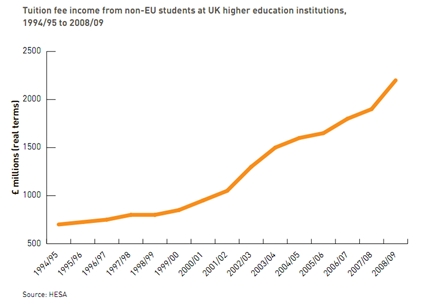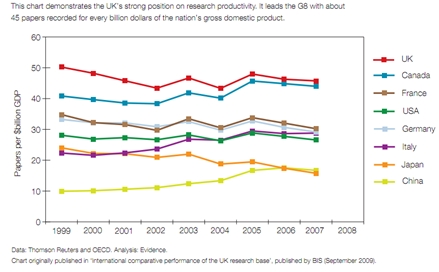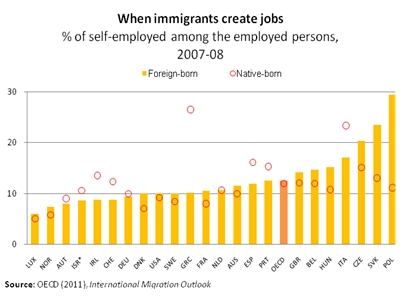 The experience of global mobility in the UK has been positive and its contribution to the economy in terms of skills, growth and job creation is vital. Awale Olad writes that immigration policy should therefore not undermine prospects for investment and economic growth.
The experience of global mobility in the UK has been positive and its contribution to the economy in terms of skills, growth and job creation is vital. Awale Olad writes that immigration policy should therefore not undermine prospects for investment and economic growth.
International mobility is central to the economic interests of many developed countries around the world. Countries such as Canada and Australia are currently engaged in initiatives which aim to open up a conversation with their electorates about the unprecedented level of economic migration headed their way, while at the same time emphasising the importance of harnessing this opportunity to build a more dynamic economy and society.
The United Kingdom, on the other hand, has pursued a migration policy which aims to reduce net migration to the “tens of thousands” a year through a cap on the number of non-EU migrants coming to the UK and this move prompted employers and business leaders to express concerns over the possibility that the cap may damage competitiveness.
A recent meeting of the All-Party Parliamentary Group on Migration (APPG) looked at the UK’s immigration policy and its potential effects on global talent and the needs of businesses. The parliamentarians discussed how international labour mobility can meet the needs of the private sector including entrepreneurs, SMEs and international corporations in the UK. Drawing upon regional and national business perspectives, MPs considered how immigration policy can effectively help to overcome skills gaps and labour shortages across the UK and provide a competitive advantage to employers.
The cross-party panel’s message was clear: experience of global mobility in the UK has been positive and its contribution to the economy in terms of skills, growth and creating jobs is crucial. Experts from the sector such as PricewaterhouseCoopers, the Federation of Small Businesses and the Centre on Migration, Policy and Society (COMPAS) at Oxford University, added their voices to the debate.
International migration to the UK has enhanced the economy in three main areas: education, small businesses and intra-company transfers. Baroness Valentine, a crossbench peer who also serves as Chief Executive to the influential business group London First, has touched on the UK’s economic self-interest – attracting growth through programmes that help businesses flourish – by first and foremost recognising that markets are led by competition, supply and demand and that the government policy and the imposed immigration target has “already been damaging” as it is set to reduce UK output “between £2-4 billion”.
The Home Office itself confirms that the reforms could cost as much as £2.5 billion, which leads to further questions on what the real costs are of losing top talent to the economy.
First it comes in the shape of tuition fees paid to universities in the higher education sector. Figure 1 below outlines a net income of more than £2.2 billion from international students’ tuition fees alone, a vital source of income for the sector.
Figure 1

Figure 2 below shows the UK’s strength as the world’s best performing nation in research productivity where huge investment is tailored out of contributions from international sources, the private sector and charities. An estimated £13 billion boost for the sector.
Figure 2

British students taking PhD degrees in engineering and other sciences are scarce and, according to Sir James Dyson, 70 percent of technology post-graduates are overseas students, a trend which is boosting the economy but is likely to be reversed with the introduction of immigration reforms. Conservative MP, Nadhim Zahawi, has stressed the need to fill vacancies with overseas talent and avoid dismissing the growing demand from business for professionals with relevant skills and expertise.
For instance, newspaper headlines about migrants taking all of the jobs create unnecessary sensationalism that prompts government knee-jerk reactions. Instead of only focusing on abuse of the immigration system, a strong argument should be made to the public that international talent brings expertise and knowledge to the UK’s workforce enhancing the ability of local businesses to compete internationally.
London business experts, London First, recently released a statement pressing for joint leadership on the need for greater ‘skills provision’ in London and the only way to achieve this is through political ownership. Primarily the London Mayor would need to give political cover and businesses would provide the ‘leadership and accountability’. COMPAS’ Sarah Spencer has backed this proposition, suggesting that while the Labour government was in power, they failed to get a grip on public perception of economic migration and businesses equally failed to make an effective argument for international talent.
Under the Coalition government, business now finds itself on the back-foot and the government is locked into a target that seems unachievable and will hurt the economy. Instead, the government and business should work on a coherent strategy for developing messages to win the public over. The following could be taken as strong starting points:
- Establish a plan which is equally committed to developing the British workforce and doesn’t denigrate British School-leavers.
- Show a genuine shortage of talent in language the public can easily recognise. Statistics are great but the existing narrative is incredibly poor.
- Businesses need to show they are dealing with abuse in terms of workplace exploitation and depreciating wages.
- The business world needs to make a strong case for family settlement and the contributions to economy they will bring.
- Finally, business needs to display levels of contribution it has made to migrant workers integrating into the UK. There is no profile for what is currently being done. If you do that, let’s not do it on a deficit model but show that employers are making a critical contribution to the wider issues at stake.
Migrants are also an essential part of invigorating the economy, contributing to growth and creating jobs. Figure 3 below from the OECD shows how migrant labour and entrepreneurism advances growth, with businesses owned by migrants slightly higher than native entrepreneurs.
Figure 3

Both the Federation of Small Business (FSB) and PricewaterhouseCoopers (PWC) have disagreed with the government’s cap. The FSB cite that 9 percent of small business owners have a proportion of workers from outside the EU – a significant fraction of the workforce – and that the cap will inevitably “act as a barrier” to competitiveness of small businesses. Interim quotas enforced speedily are unhelpful and send a negative message to foreign investors. Some foreign companies have already begun a trend of moving headquarters overseas as a result of the UK’s immigration policy, hurting the UK’s economic utility of migrant labour.
Politicians will continue to struggle with the prominence of international migration in the UK, especially with the demand for a pool of migrant labour coming from business.
But business leaders need to recognise their position within the debate, and make a good case for why international mobility is important for economic development and ensure our ability to keep growing in the field of global financial market relations. A concerted approach is needed from both parties against the backdrop of the concern about levels of migration that influences public opinion for the good of our economy.
Please read our comments policy before posting.







Good analysis Awale. What I wonder is how do you strike a balance between re-training (or skilling up) the existing stock of population and allowing business to recruit from abroad. Seems like a hard thing to crack to me.